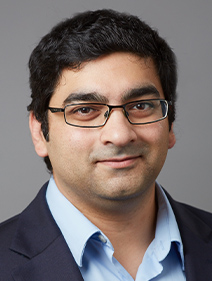2021 Lung Cancer Research Foundation Pilot Grant

Nikhil Joshi, PhD
Yale University
Research Project:
Manipulating the functions of T cells in lung tumor draining lymph nodes
Summary:
Immunotherapy has changed the face of lung cancer treatment over the last decade, but the fraction of lung cancer patients that benefit from immunotherapy remains low. Immunotherapies require T-lymphocytes inside of tumors to kill tumor cells, but in many patients these T-lymphocytes are not present. Dr. Joshi and his team have used animal models and analysis of patient samples to discover that there are also tumor-killing T-lymphocytes that are located in lymph node glands, but why these cells do not respond to therapy remains not known. In their LCRF-funded project, Dr. Joshi and his team will test strategies for (1) helping immunotherapy make T-lymphocytes leave the lymph node and to travel into the tumor and (2) making T-lymphocytes more effective once they enter the tumor. The goal of this research is to improve therapy in animal models that get a cancer that mirrors the disease that is found in lung cancer patients, so that the findings will be as applicable as possible to the therapies that are used in the clinic.
* This project was awarded the James B. Dougherty, MD Award for Scientific Merit acknowledging the investigator whose proposal was selected for outstanding overall merit by LCRF’s Scientific Advisory Board.
Final report:
The project was designed to study the drivers of CD8 T cell differentiation in lung cancer with the intention of improving therapeutic responses. Most of the progress has been with Aim 2 in which the researcher has designed a guide against key transcription factors and epigenetic modifiers. New aspects of CD8 T cell biology have been uncovered regarding the current understanding of T cell exhaustion. Deletion of Klf2 (a protein of importance in T cell function) in cells when challenged by infection produced T cell exhaustion similar to what is seen in cancer. The question is whether Klf2 overexpression can enhance the effect of CAR T cells by preventing exhaustion thus increasing therapeutic potential. Preliminary data suggests that over expression of Klf2 in CD8 T cells acts to promote CD62L high CD8 T cells resembling stem-like, or progenitor exhausted CD8 T cells that retain maximum functional potential. Aim 1 to investigate the role that dendritic cells play in mediating therapeutic response by stem like CD8 T cells in tumor-draining lymph nodes is just starting at this time.
Impact:
T cell activity is a very important component in the immune response to both cancer and infection. One of the causes for lack of/or decreased response to immunotherapy is T cell exhaustion. The researcher is trying to better understand the reasons for T cell exhaustion. He has found out that Klf2 (a protein of importance in T cell function) when decreased or missing can induce the presence of T cell exhaustion. Obviously understanding why T cells stop working is an important step in developing strategies to prevent this from happening so that the immune response to the presence of cancer can be promoted. CAR T cells which are engineered T cells have been important in the treatment of hematologic malignancies and in melanoma. They are being investigated in lung cancer. If they can be engineered to have higher levels of Klf2 perhaps T cell exhaustion could be limited, making this type of treatment more effective. This research is early in its development but has great future potential.
